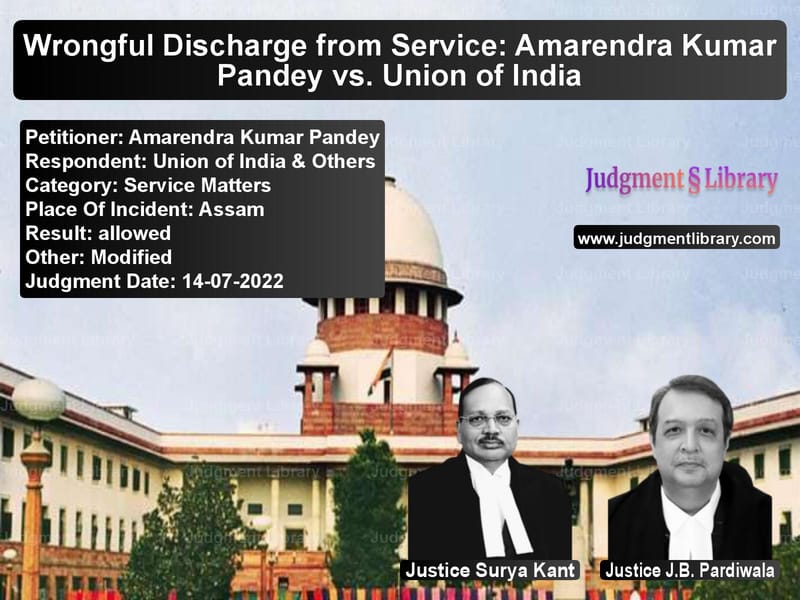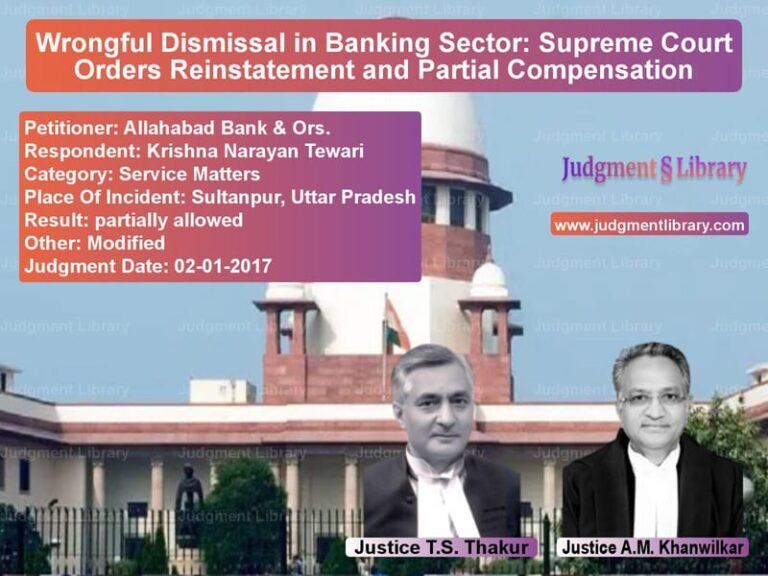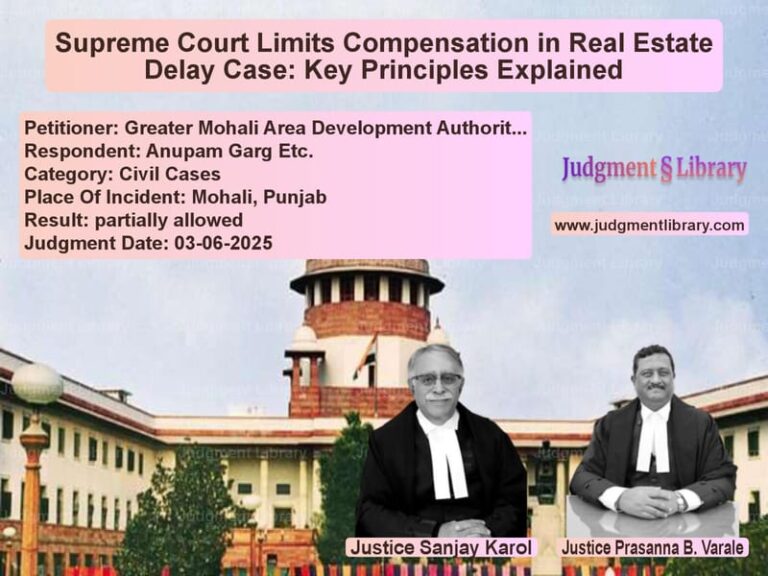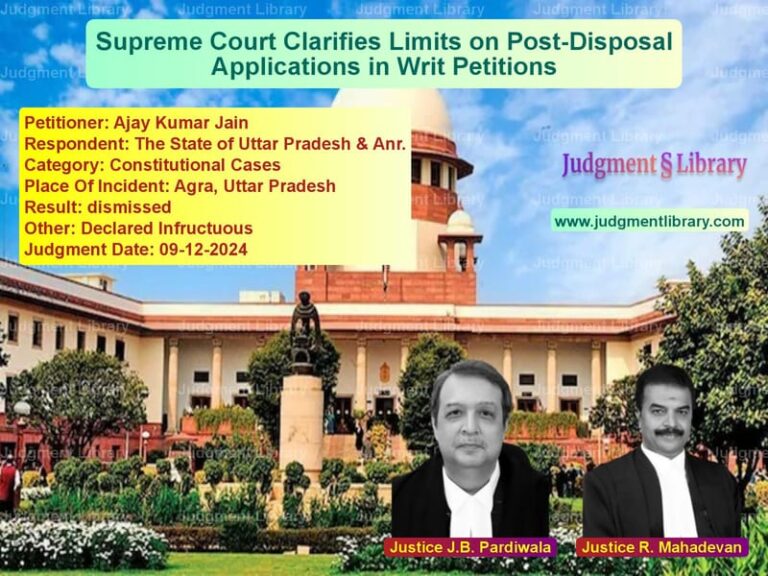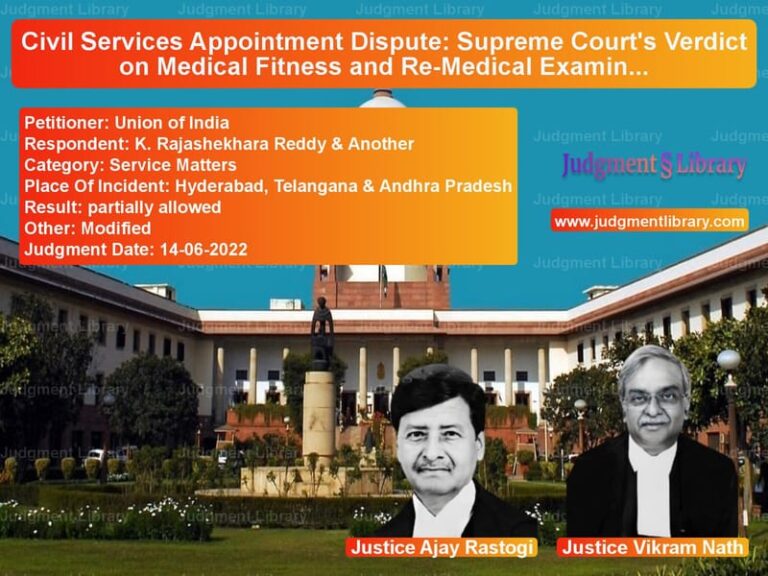Wrongful Discharge from Service: Amarendra Kumar Pandey vs. Union of India
The case of Amarendra Kumar Pandey vs. Union of India is a significant ruling concerning wrongful discharge from service, the discretion of commanding officers in military forces, and the protection of employment rights in armed forces. The case revolves around the petitioner, Amarendra Kumar Pandey, who was discharged from the Assam Rifles based on four Red Ink entries, and his legal battle to challenge the discharge.
Background of the Case
The petitioner, Amarendra Kumar Pandey, was enrolled in the Assam Rifles in 1993 as a Rifleman. On January 31, 2004, he was discharged from service based on four Red Ink entries in his service record. The commanding officer concluded that his conduct was incorrigible and detrimental to public service.
His Red Ink entries were recorded for minor offenses:
- 1996: Overstayed leave to take care of his ailing mother.
- 1998: Attempted to make an unauthorized phone call but was stopped before leaving the compound.
- 1999: Lost his luggage while returning from leave.
- 2004: Caught playing cards alone in the barracks.
Each of these incidents resulted in punishments such as detention, rigorous imprisonment, and salary deductions.
The petitioner challenged his discharge in the Guwahati High Court. The single-judge bench ruled in his favor, stating that his offenses were not serious enough to warrant dismissal and ordered a review of the decision. However, the Division Bench overturned this ruling, holding that the Assam Rifles Act and regulations did not mandate recording reasons for discharge.
Dissatisfied with the High Court’s ruling, the petitioner approached the Supreme Court.
Arguments by the Petitioner (Amarendra Kumar Pandey)
The petitioner’s counsel contended that:
- Discharge is not mandatory upon receiving four Red Ink entries.
- The offenses were minor and did not justify dismissal.
- The Assam Rifles Act and Manual do not make dismissal automatic upon receiving four Red Ink entries.
- The decision to discharge lacked due process, as there was no formal inquiry into the necessity of dismissal.
- The discharge order lacked proper reasoning and was issued arbitrarily.
- The petitioner should have been allowed to complete his service tenure to qualify for a pension.
Arguments by the Respondents (Union of India)
The government argued:
- The petitioner’s disciplinary record showed a pattern of misconduct.
- Assam Rifles regulations provided commanding officers with the discretion to discharge personnel with four Red Ink entries.
- The petitioner was given an opportunity to respond to the discharge order, but his explanation was unsatisfactory.
- The High Court was correct in ruling that a formal inquiry was not required before issuing a discharge order.
- The petitioner had already received leniency in prior offenses and further retention would affect discipline in the force.
Supreme Court’s Observations
The Supreme Court, comprising Justices Surya Kant and J.B. Pardiwala, critically examined the case. The Court noted that while military discipline is paramount, discretionary powers must be exercised fairly and rationally.
The Court observed:
“The mere fact that an individual has earned four Red Ink entries cannot be the sole basis for discharge. The authority must consider the nature of offenses and the possibility of reformation before issuing a dismissal order.”
It also held that:
- The petitioner’s offenses were not grave enough to justify discharge.
- The Assam Rifles Manual and Regulations do not mandate automatic dismissal for four Red Ink entries.
- The discharge order lacked reasoning and was not a considered decision.
- Military discipline does not mean arbitrary exercise of power by authorities.
Supreme Court’s Final Ruling
The Supreme Court set aside the discharge order and ruled in favor of the petitioner:
“The order of discharge passed against the appellant is hereby set aside. The appellant shall be treated to have been in service till the time he would have completed the qualifying service for grant of pension.”
The Court ruled that:
- The petitioner shall be treated as in service till he completed the required tenure for pension.
- He will not receive back wages but will get full pension benefits.
- The government must process his pension benefits within four months.
Key Takeaways from the Judgment
The Supreme Court’s decision establishes an important precedent in employment law within the armed forces:
- Discharge is not automatic: The presence of four Red Ink entries does not mandate dismissal.
- Nature of offenses matters: Minor infractions do not justify discharge.
- Due process must be followed: Authorities must justify why dismissal is necessary.
- Pension rights must be protected: Personnel should not be arbitrarily denied pension.
- Judicial review applies to military decisions: Courts can intervene if military authorities misuse discretionary powers.
Conclusion
The judgment in Amarendra Kumar Pandey vs. Union of India underscores the importance of fairness and due process in military discharges. The Supreme Court’s ruling ensures that personnel are not arbitrarily removed from service without proper reasoning and that their long-term benefits, such as pension, are safeguarded. This decision serves as a crucial precedent in employment-related disputes in the armed forces.
Petitioner Name: Amarendra Kumar Pandey.Respondent Name: Union of India & Others.Judgment By: Justice Surya Kant, Justice J.B. Pardiwala.Place Of Incident: Assam.Judgment Date: 14-07-2022.
Don’t miss out on the full details! Download the complete judgment in PDF format below and gain valuable insights instantly!
Download Judgment: amarendra-kumar-pand-vs-union-of-india-&-oth-supreme-court-of-india-judgment-dated-14-07-2022.pdf
Directly Download Judgment: Directly download this Judgment
See all petitions in Termination Cases
See all petitions in Pension and Gratuity
See all petitions in Disciplinary Proceedings
See all petitions in Public Sector Employees
See all petitions in Other Cases
See all petitions in Judgment by Surya Kant
See all petitions in Judgment by J.B. Pardiwala
See all petitions in allowed
See all petitions in Modified
See all petitions in supreme court of India judgments July 2022
See all petitions in 2022 judgments
See all posts in Service Matters Category
See all allowed petitions in Service Matters Category
See all Dismissed petitions in Service Matters Category
See all partially allowed petitions in Service Matters Category

